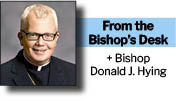
In our human experience, death holds an absolute finality. When loved ones pass, they never come back. Their absence creates a strange emptiness in our lives.
In the initial days and weeks after their death, we still expect to see them, to call them up. We want them to walk through the door, just like in the old times.
Then, grief sets in as we realize that we will never see them again in this life.
Our faith and death
Without faith, death would be unbearable, an absurd, meaningless snuffing out of our paltry existence, as our dreams, work, love, and experience simply vanish into the ether of crushing mortality.
More people in our society seemingly live without faith and I often wonder how they process death.
Whenever I ask them, no clear or satisfying answer emerges. Such uncertainty makes me even more grateful for the Catholic faith which contains the true and beautiful understanding of life and death.
We know that death was not part of God’s plan for us. We experience it as unnatural and untimely, and so it is.
Its corruption and tragedy enter the scene as the bitter and enduring fruit of Original Sin.
Because our first parents radically rejected God, they walked away from Life and therefore chose death.
Yet, even in the first shockwaves of that deadly shipwreck at the beginning of the world, God utters an astonishing prophecy to the serpent, words which the Church Fathers called the protoevangelium or the pre-Gospel.
In Genesis 3:15, God proclaims that the Son of the Woman will crush the serpent’s head in an absolute and permanent way.
As Christians, of course, we know that the Woman is Mary and her Son is our Lord and Savior Jesus Christ.
Jesus came into the world to save us, to lead us through the shadow of death and into the Promised Land of eternal life.
He does not take away the reality of death, that stubborn fact that lurks pensively at the end of our earthly journey, but He transforms it by taking it on Himself in the mystery of His Passion and Cross.
By embracing our death and lifting it up to the Father, the Lord takes away death’s power and finality.
In the glory of the Resurrection, death does not have the final word on us.
Rather than being the end of everything, our dying is actually the sacred birthing process by which we enter into the fullness of eternal life.
Seen through the lens of the Paschal Mystery, death becomes our most creative act, the final adventure leading us home to the glory of the Father’s house.
A month of prayer and rejoicing
In this month of November, with its gray skies and icy breath, as nature dies all around us, the Church bids us to rejoice with the saints in heaven and to pray for the Holy Souls in Purgatory.
In His gracious mercy, the Lord allows us to offer our love and pray on behalf of the dead to ease and assist their process of purification before entering the wedding feast of Heaven.
Some Catholics seemingly have problems with the doctrine of Purgatory.
I honestly do not know why because I find it tremendously consoling.
It means that, even in death, God is not finished with us.
He mercifully cleanses us of all the lingering vestiges and dark baggage of sin, anything that is not of Him, so that we can glow with the holy light of the Lord in the radiance of Heaven.
Purgatory reminds us that we are not perfect when we die, and that our salvation is God’s work, yet He permits us here on earth to contribute in a small way to the salvation of our brothers and sisters through the offering of Masses, personal prayer, and indulgences.
Our loved ones have not simply vanished into nothingness, but have moved into that sacred and mysterious place of spiritual preparation in anticipation of eternal union with the Most Holy Trinity.
For this reason, we remember the dead with love as we pray for them in a sacred act of charity and mercy.
This past summer, I walked the Camino de Santiago in Spain with 53 people.
Every morning before we set out, Juan Landa, our leader and guide, would tell us the name and location of the restaurant which would be our endpoint and meeting place for the day.
As the afternoon waned, clumps of weary and aching pilgrims straggled in after hours of walking, and those already arrived would raise a cheer of welcome, applaud, and hug the newcomers and buy them something to drink.
This happy experience of homecoming reminded me that many poets have called Heaven “the tavern at the end of the world,” this joyful place of reunion where pilgrims find an eternal welcome and embrace in the Father’s heart and home.
When we grieve the loss of loved ones, when we fear our own bodily death, when the cares and anxieties of this world snuff out our joy, we need to remember that this “tavern” at the end of the world shines beyond the stars, where the saints and angels make merry in their worship of God, rejoicing at the homecoming of every traveler, and where death is no more.
Jesus Christ has conquered sin and death forever; the victory is already won.
November lifts our spiritual vision to keep our eyes on the prize!

